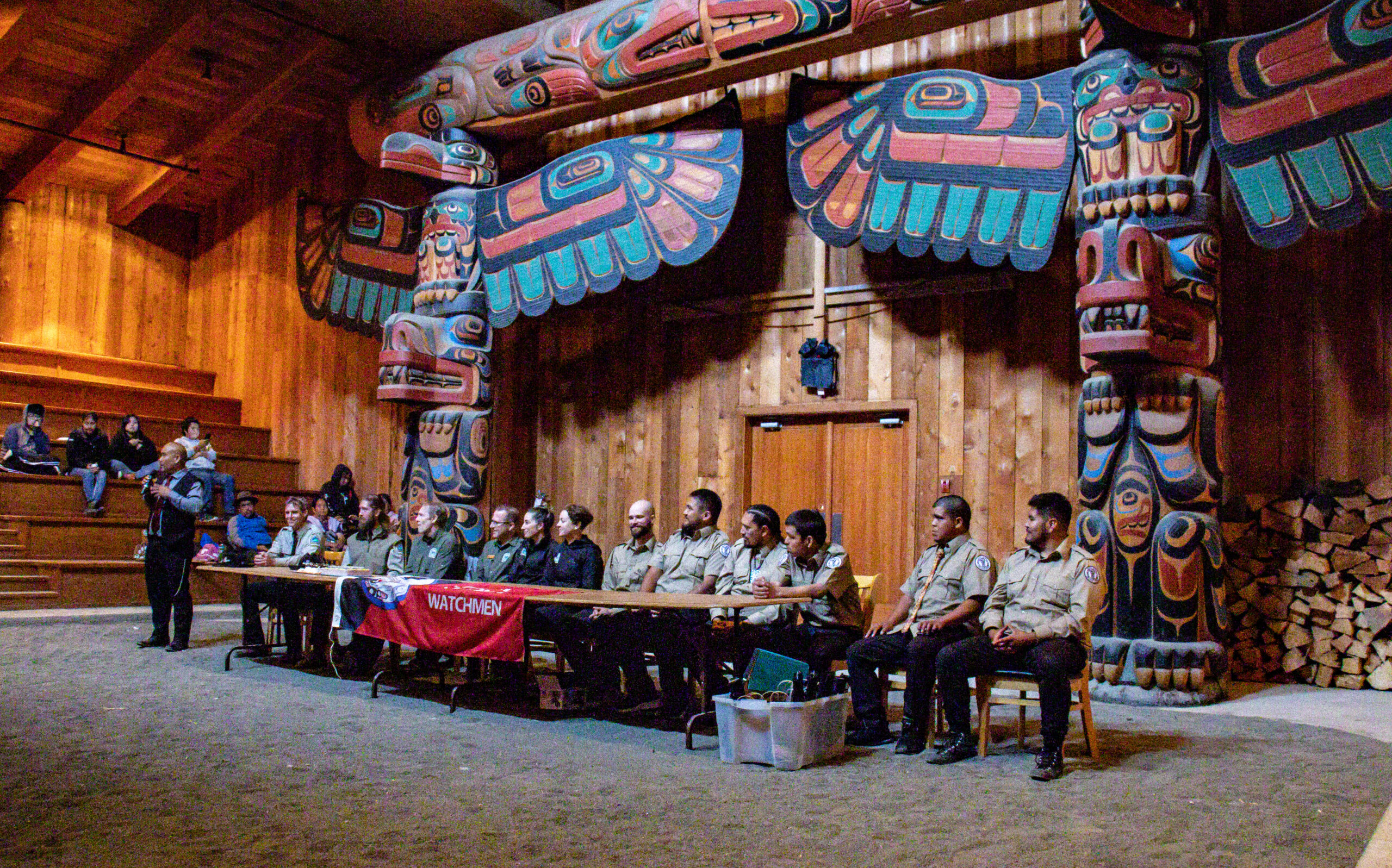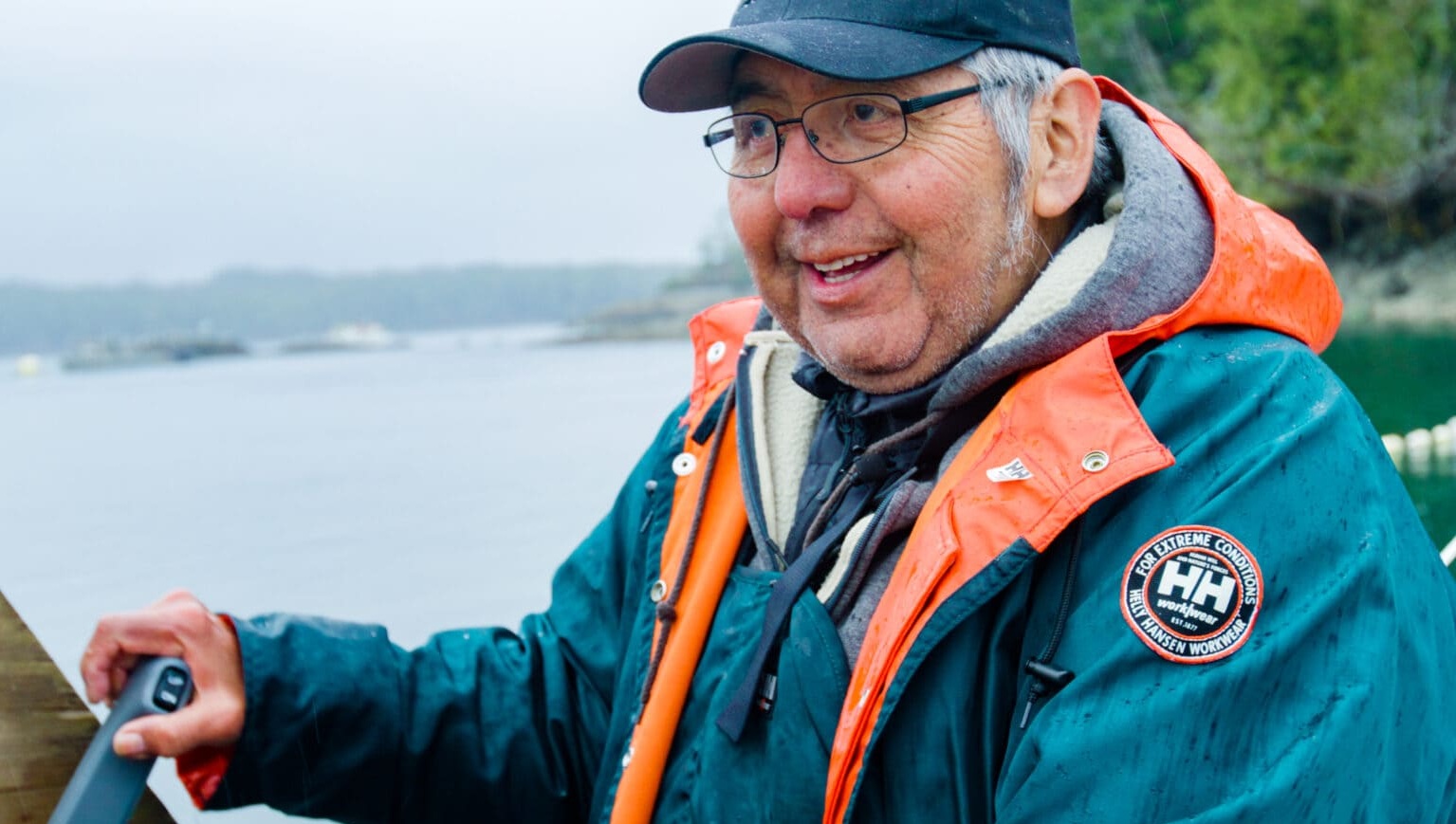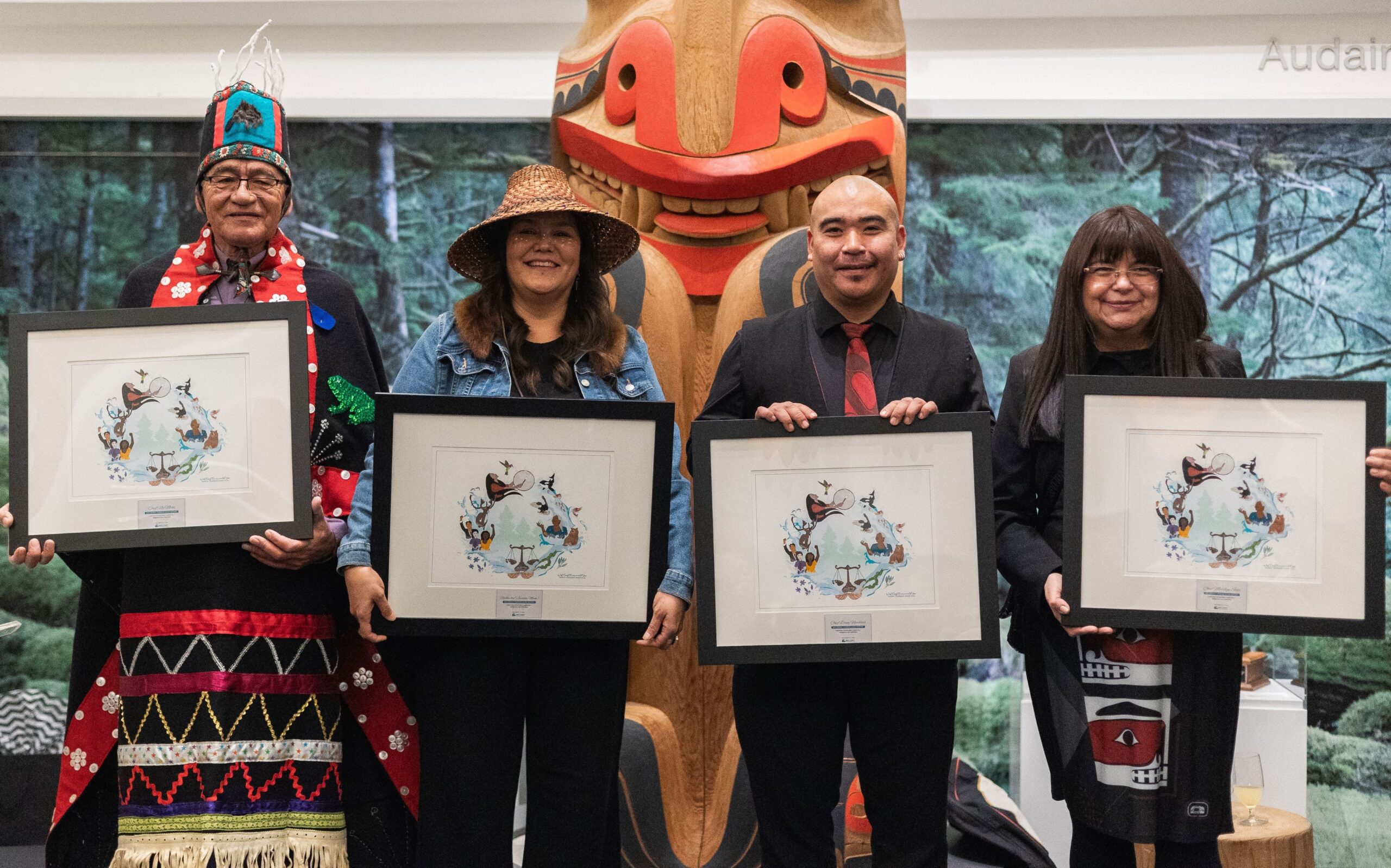Guardians from two Coastal First Nations, the Kitasoo Xai’Xais Nation and the Nuxalk Nation, received park ranger badges and associated legal powers from BC Parks last week. The achievement — a power-sharing agreement born from decades of hard work, relationship-building and training — is the first-of-its-kind in B.C. and Canada.
“This is groundbreaking, it’s historic,” says Kitasoo Xai’Xais Chief Councillor Doug Neasloss. “This will set a new path for our Guardians. We’re able to come together today because of the people in the background on all levels helping to make it possible. If there’s an example of reconciliation, this is it.”
With the earned badges, 11 Guardians, six from the Kitasoo Xai’Xais Nation and five from the Nuxalk Nation, will also be designated with the same legal authorities as park rangers, to uphold and enforce the Parks Act, within the parks and protected areas in their ancestral territories. In June 2022, the Kitasoo Xai’Xais and Nuxalk Nations, along with BC Parks, signed a memorandum of understanding (MOU), to develop the Shared Compliance and Enforcement Pilot Project. Since then, a technical working group formed between the partners has been developing components required to support the implementation of the program.
Nuxalk Nation Chief Councillor Samuel Schooner says the Guardians, as well as their newly appointed status, represent “a modern link to ancestral responsibilities.”
“As Nuxalk, we hold an unrelinquishable su7ulm (title right) over our territories, which we have successfully stewarded for thousands of years,” says Chief Schooner. “We are proud to see them take on the additional authority that comes with a BC Parks ranger designation.”
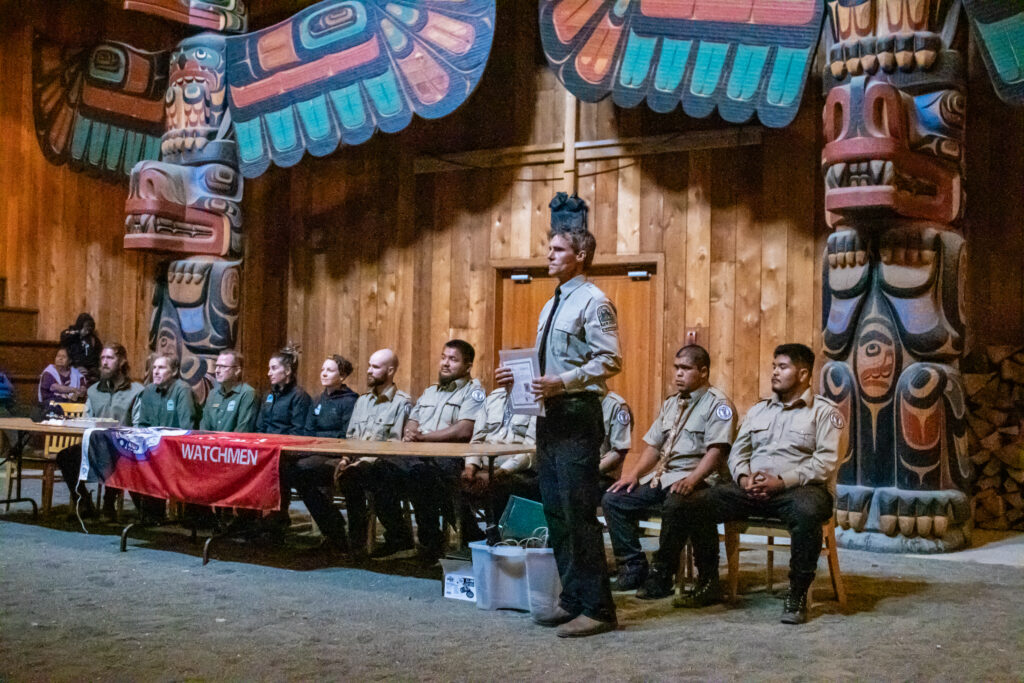
Guardians set a new bar for First Nations
During a ceremony held in the Kitasoo Xai’Xais bighouse, Chief Neasloss spoke about the illegal activity that took place in their territory during different eras and the many people who helped build up the Guardian program to move it to where it is today.
“I remember sitting at land-use planning tables with our community in the early 90s. At that time there were so many illegal activities happening in our territory — illegal fishing, illegal hunting, illegal forestry. That’s when the community said ‘we need to have a presence out there, our own people to monitor, patrol and take care of our territory,’” Neasloss says. “We had no resources at that time. We were trying to get money together to buy a boat.”
When the Guardian program started off in their community, Chief Neasloss says, it was a few Kitasoo Xai’Xais guys out in their territory with a notebook, recording and documenting every and all sightings — boats, bears, whales.
“Our original Guardians were instrumental in starting this program. Back then, we talked about how to develop our professionalism, our logo, our uniforms, our data collection methods and processes. We wrote everything down, thousands of notes of paper,” says Neasloss. “We did our research and learned from other groups and Indigenous Peoples in other countries about their systems.”
Neasloss says “a lot of people in the background coming together” and relationships over many years helped make the unique power-sharing agreements a reality. Steve Hodgson, the Parks and Protected Areas Section Head for Bella Coola, has been living out of Nuxalk territory for the last 19 years with his family. He has been working closely with Chief Neasloss, Chief Schooner, the entire BC Parks team and both communities over the years to help develop the partnership. Volker Michelfelder, a regional director for BC Parks has also lived in the Bella Coola valley for years, remembering some of the Guardians when they were “just in diapers,” he tells the Nuxalk community during the second badge ceremony.
“Back then, we wouldn’t have been able to imagine what the Guardians are now, or that one day these authorities would be given back to the Guardian Watchmen in this way,” says Michelfelder. During the celebrations, the Nations, Guardians and BC Parks signed the formal agreement, which outlined the authorities attained through the appointment letters and badges.
“The Guardians will remain the Guardians of the Nation. They are Guardians first and foremost but will be able to share the authority of BC Parks and provide action where required,” Hodgson says. “It’s a monumental occasion. I’m proud of the years of work it has taken to get to this point and am grounded in the work yet to be done.”
David Ranson is the Executive Director of BC Parks’ Provincial Services Branch, which looks after a number of departments, including Indigenous Relations. Ranson says the pilot project has been “a long time in the works” as their team has been working to create a framework to enable the delegation of park ranger authorities while the Guardians have been busy completing the necessary training courses. Ranson says the agreement represents the recognition of the “rightful authority as stewards of the land.”
“It’s the first time the province, a law enforcement agency, has delegated Crown power in this way,” Ranson says. “So much knowledge has come from our relationship with the Nuxalk and Kitasoo Xai’Xais Nations, because of their deep connection to the land, the animals, their places, that they share with us. It deepens our western science approach, our Crown-land management approach, making it stronger, deeper, richer, to learn of the personal connection of people who have lived here for thousands of years.”
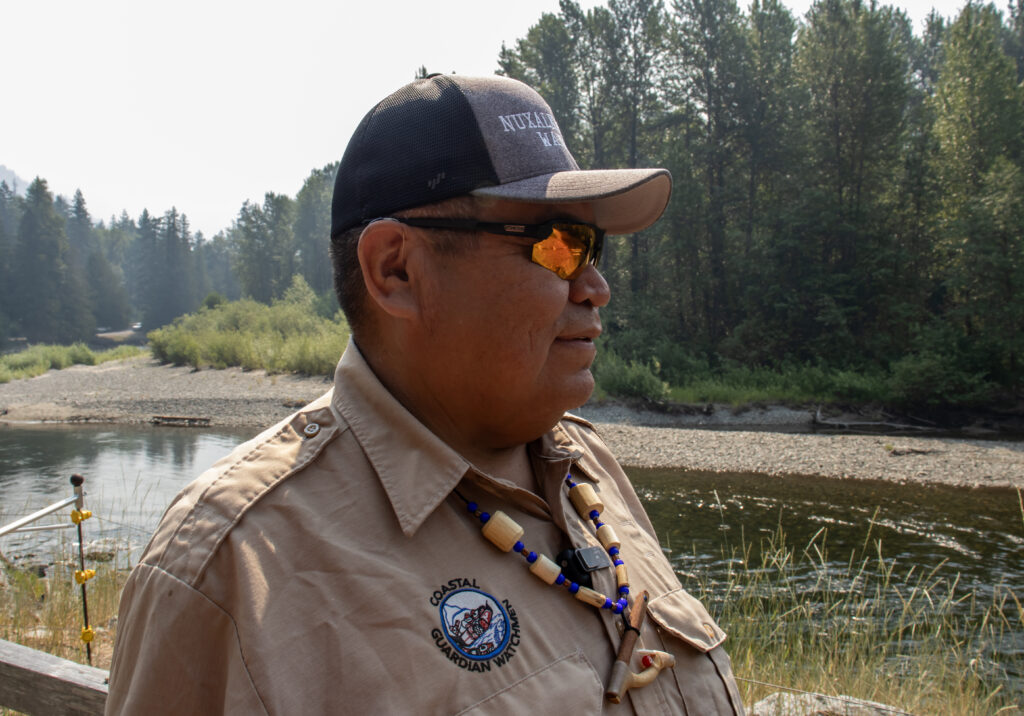
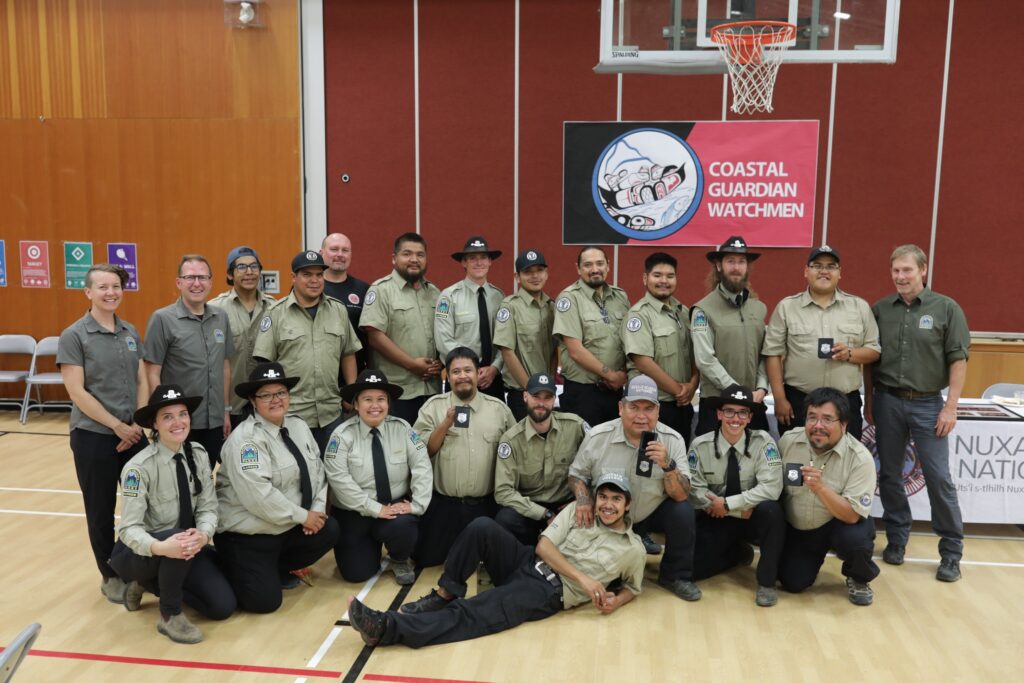
‘We Remain Guardians’
Ernie Tallio has been managing the Nuxalk Coastal Guardian Watchmen since 2013. He was one of the first Guardian Watchmen for his Nation. It’s crucial, Tallio says, that “people understand that even after the badges are given out, that Guardians do not become park rangers, but will remain Guardians of their territories.”
“Part of building this work is making sure we’re not going to lose our identity as Nuxalk Guardians. Protected and conserved areas are a part of our territory, but we still have other areas of our territories to patrol and monitor. A lot went into this designation, but it’s a part of what we do,” Tallio says.
“We remain Nuxalk Guardian Watchmen first and foremost.”
Medrick Robinson has been a Kitasoo Xai’Xais Guardian for about six years. His uncle Clark Sr. used to be a Guardian Watchmen and he’s been going out on the water with him since he was about 13 years old, he says.
“It means a lot to get this badge, it took a lot out of me. It was a lot of training, especially over the winter months,” Robinson says. “Our job won’t change. I love being out on the water. I’ve been taught since I was a kid. I know where the rocks are, everything else. It’s nice to be recognized as First Nations who have the authority. I hope other Nations follow suit, that we’re all on board.”
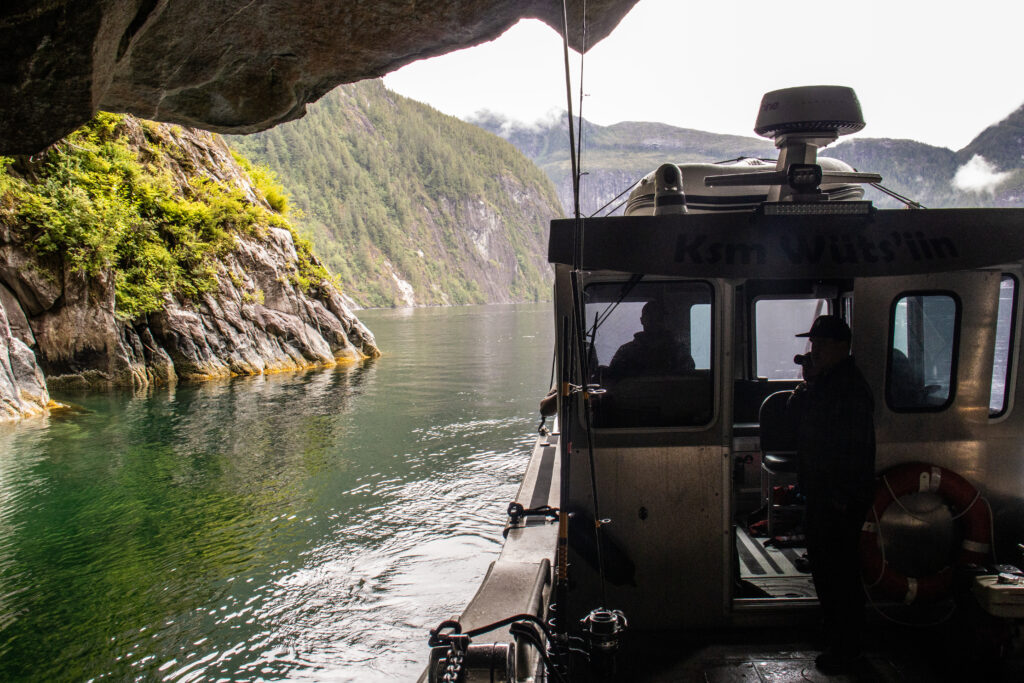
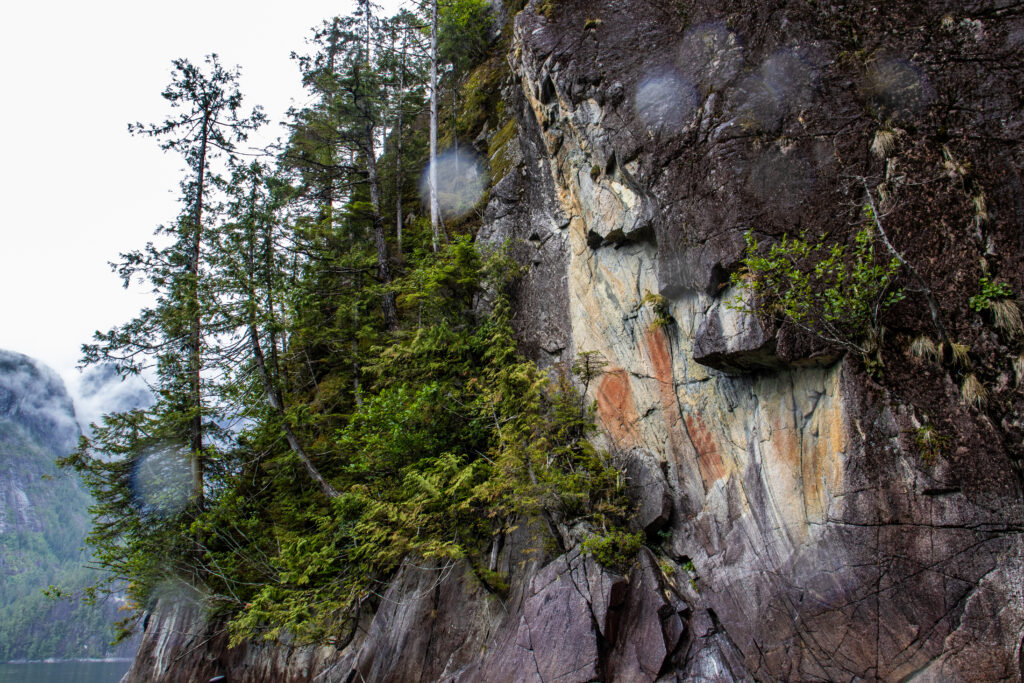
‘It’s up to you now’
The Guardian Watchmen Coordinator and Operations Manager for the Kitasoo Xai’Xais Stewardship Authority, Brady Stjerneberg, has been in the role for two years, but has worked as a Guardian for the Nation for seven.
“Before, our Guardian Watchmen were always observing and reporting, under colonial law, we didn’t have the authority to enforce. Within Indigenous laws, and this Nation’s laws, that authority is there, but this is bringing in another level of law,” Stjerneberg says. “The training — defensive tactics classes, verbal judo, university courses through BCIT, Parks Law and Administration, diving deep into what the authorities of a park ranger are, how to use them in our context, as well as the capacity building and confidence is another kind of recognition.”
Just weeks before the badge ceremonies, the Kitasoo Xai’Xais Guardians encountered a crab boat in Griffin Pass, an area of their territory that has been closed to commercial crab fishing for a number of years. They questioned the people coming in, who told the Guardians they thought they were in an open area. Kitasoo Xai’Xais Guardian Spencer Mason says they explained the closure to the fishermen and asked them to put the crab back in the water.
“We told them we were trying to close these areas to preserve what’s left. They had 71 crab traps in the area and we asked them to pull their pots up. They pulled three live-haul pots, all filled up, and pulled the rest of the 68 crab pots,” Mason says. “Our job is to help preserve what is left, even for us. So much has been and is getting taken out. He was good with us, dropping whatever he had and pulling the traps and leaving the area. It has been closed for years.”
Mason’s paternal great grandfather came from Kynoch. Mason grew up with his dad’s father from a young age.
“My dad’s dad was from Klemtu, lived in the Kitasoo area. His wife was from Haida Gwaii. I grew up hearing stories about where they camped and fished. They would camp six months of the year, come back with what they got,” Mason says. “My grandfather used to work in a logging camp, until he couldn’t work anymore. One day, he called me and said, ‘one day you’re going to be looking after this, it’s going to be up to you guys now.’”
Mason says it took him a few years to understand his grandfather’s words.
“There was a lot of illegal activity at the time. He didn’t know the Watchmen Program would start up… he was doing this 30/40 years ago, protecting it for us, fishing areas, bears, the land, he told me a lot of stories… I think he would be really happy to see what’s happening now, what he left behind… that we’re working to make sure everything is left.”
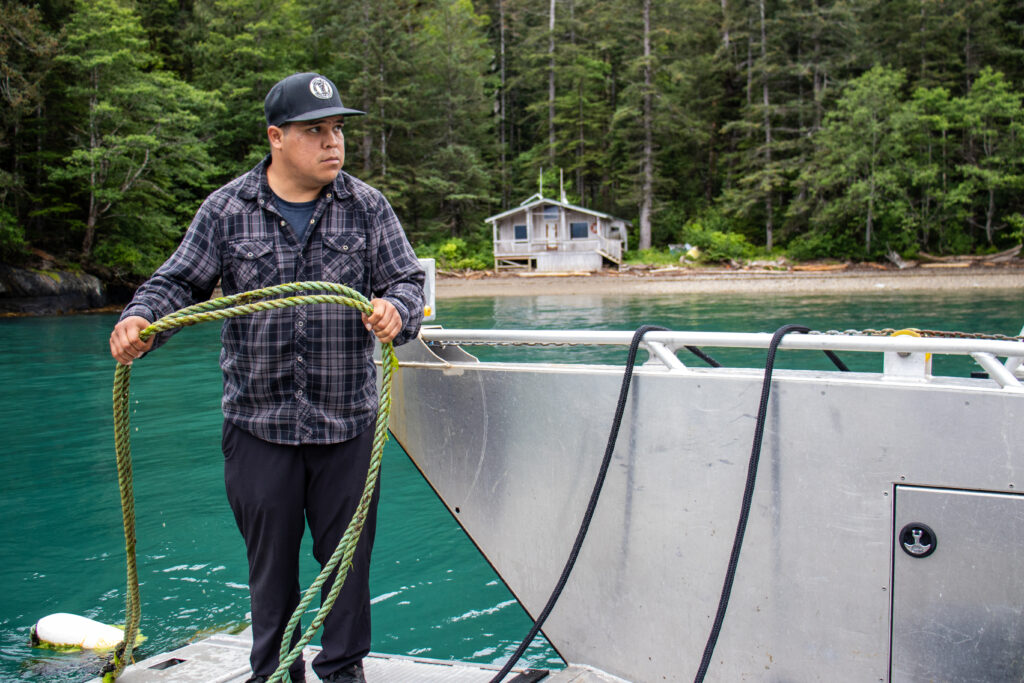
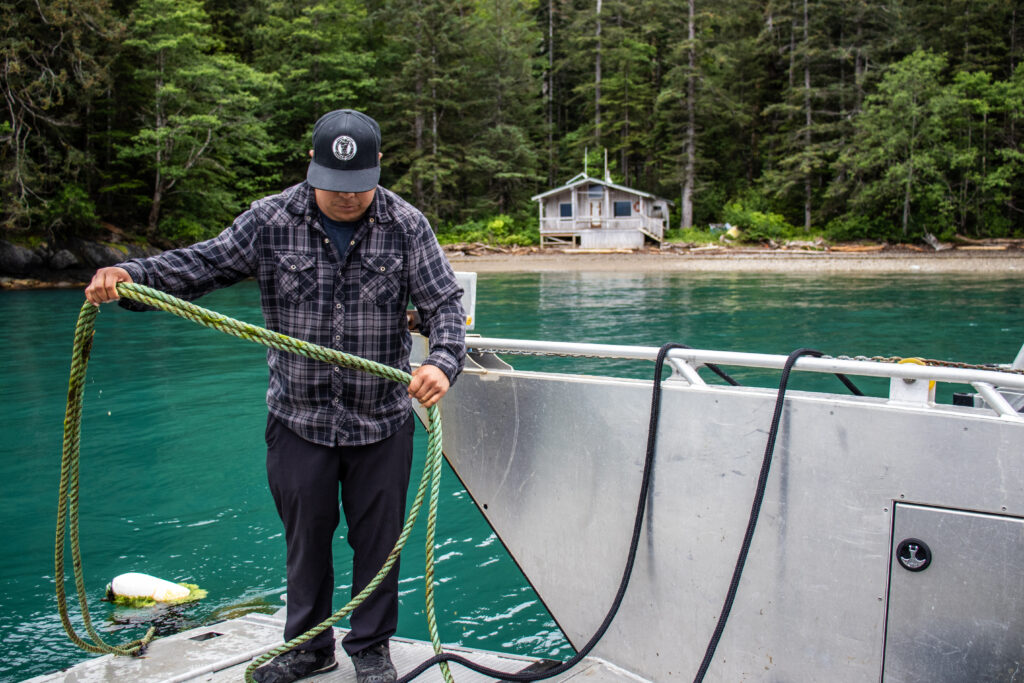
‘We take pride in standing together’
Aroha Miller is the program manager for the Coastal Stewardship Network (CSN), one of Coastal First Nations’ programs which acts as a conduit between the Great Bear Initiative and the stewardship offices. The CSN helps with everything from Guardian support, safety planning, tools, training, professional development, resources, uniforms, the regional monitoring system, data management and more.
“This is a huge achievement, it’s a massive achievement. It’s powerful to see the Guardians and their families and Nations, proud to be in this moment,” says Miller. “But it should never have had to be done. The authority to care for their own resources and territories has always been with the Nations and they have had to adapt and flex to fit into colonial systems, rather than the other way around.”
Miller attended both community celebrations in Klemtu and Bella Coola where she says she didn’t stop smiling all week.
“To all the people who made it, and are trying to make it happen, kudos, because it’s stepping out of alignment with the current colonial system, and it’s important to do it and to move forwards together,” Miller says. “You can feel how much the Guardians understand the weight of what they’re taking on, protecting their resources for their people and for future generations — it’s a big deal.”
During both ceremonies, elected and hereditary leaders, as well as community and family members shared words of support and advice to the Guardians. Kitasoo Xai’Xais hereditary Chief Charlie Mason reminded the Guardians of the growing responsibility they carry in representing their Nation.
“You’re representing your Chiefs, your Matriarchs, your Elders, your whole community. We take pride in standing up together. We thank everyone for their efforts, the ones behind the scenes standing up for us to do the work necessary for us to be here today,” Chief Mason says. “If your work means something to you, it means something to us. We work together to bring back the resources that were once plentiful in our lands. Do good work, make us proud, keep it up.”
